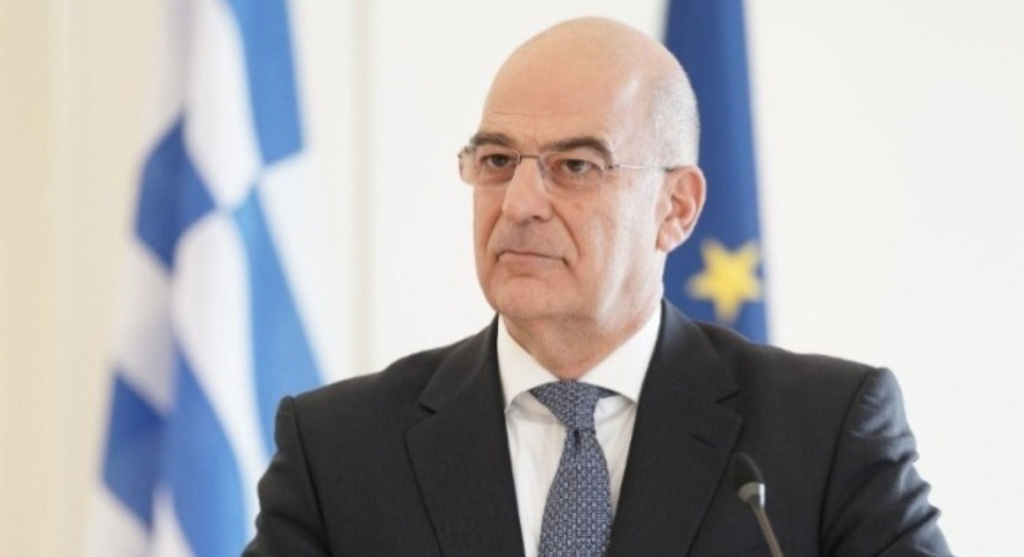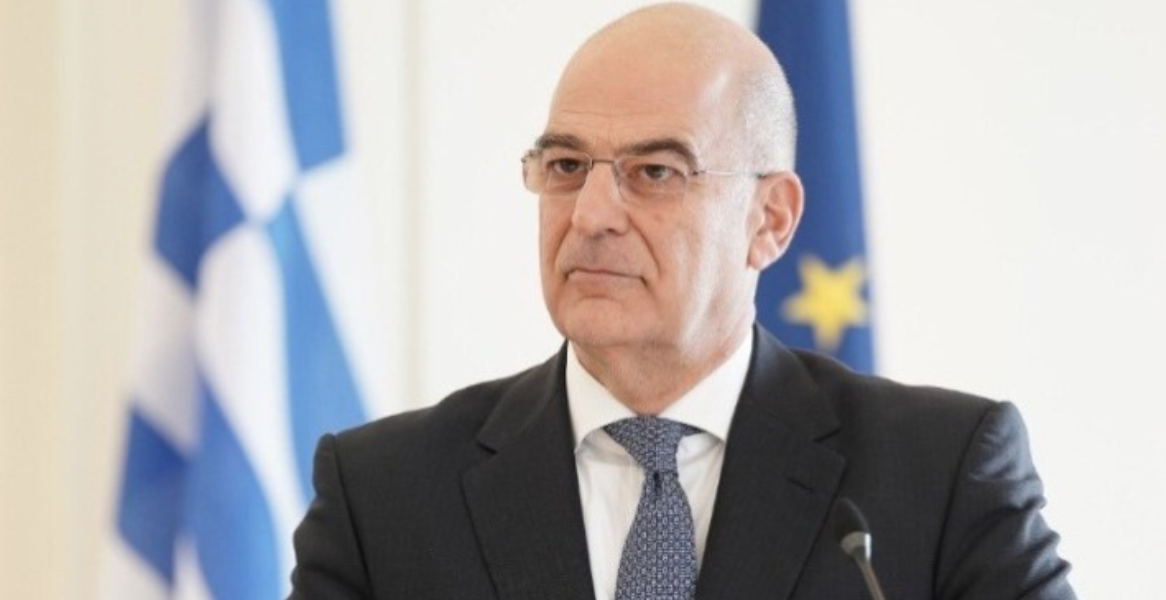
Foreign Minister Nikos Dendias spoke to Ethnos and discussed the Turkish provocations, the position of Greece in the Balkans and trilateral cooperation schemes that have been forged on the basis of common interests and shared values with long term.
"We are prepared to face any hostile action, no matter where it comes from. Of course, we have considered many different scenarios," he said, warning Turkey that "revisions and 'grey zones' could boomerang on her."
Ethnos: In Evros, Greece showed determination, shielding the border line and erecting a fence which Athens is determined to expand. In the seas of the Mediterranean, however, on the other hand - where fences cannot be placed - how do we shield ourselves against Turkish provocation?
Dendias: Expanding the fence will further strengthen our security and protect our borders. At sea, the Greek Armed Forces and security services operate daily as a deterrent against any attempt to violate Greek sovereignty. Of course, Frontex [European border agency] was also present. We are prepared to face any hostile action, no matter where it comes from. Of course, we have looked at many different scenarios. As the Prime Minister has pointed out, from Evros to Kastelorizo and from Ereikousa to Gavdos, Greece will always defend its territorial integrity and security effectively and confidently. This is the obligation of all Greeks, whatever position they hold, in whatever faction they approach. We are a peaceful country, committed to International Law and seek the cooperation of all states. However, we are not going to relinquish our sovereignty and sovereign rights, and if anyone turns against us, it is our constitutional obligation to defend the country.
Ethnos: Against the backdrop of Turkey's challenges in the Mediterranean, some are calling for the resumption of the submission of maps and coordinates with the external borders of the Exclusive Economic Zone (EEZ)/continental shelf from Greece to the UN. Is this something we are really working on?
Dendias: As you know, we are in negotiations with Italy and Egypt to delimit our maritime zones. Our country's constant pursuit is to delimit the maritime zones with all our neighbours, including Turkey, by implementing what is provided in the pre-eminent legal reference text, the United Nations Convention on the Law of the Sea. It is clear that our right to the law of the sea for continental shelf applies automatically and from the beginning without being subject to any restrictions. In addition, International Law is perfectly clear about the islands, regardless of its vague invocations by many Turkish officials, who are simply exposing themselves: Article 121 of the Law of the Sea explicitly provides that islands, regardless of size, have full rights in maritime zones, as well as on mainland. Also, the demarcation of the continental shelf and EEZ must be done in accordance with the rules of international law and based on specific principles and agreements. In this context, we are negotiating exclusively with the countries of our region. Turkey's efforts to ignore geography and its neighbours and to enforce fictitious rules of international law have no counterpart and have been condemned by the international community. Let Turkey pay better attention to the Treaty of Lausanne and treat it with respect and without revisionism. Reviews and "grey zones" could boomerang on her. It could for e.g. argue that, under Article 12 of the Treaty of Lausanne, the maximum limit of Turkish rule in the Aegean is 3 nautical miles with respect to the islands included. And yet, it could say that there are islands beyond 3 nautical miles from the Turkish shores which do not fall under the exceptions and which are owned by Turkey.
Ethnos: The IRINI operation [EU's operation to stop Turkish arms delivery to Libya], although launched last March, was delayed by the theory in practice. Are you optimistic that it will be able to work effectively in favor of stability in the region?
Dendias: IRINI is tasked with maintaining the arms embargo in Libya and is extremely important for the security of the entire Mediterranean. That is why Greece is not only participating, but will take over, in the second half of IRINI's operation, its operational management. Of course, to put it bluntly, ensuring that the implementation of the decisions of the UN Security Council, regardless of any surveillance operations, is left to the UN members themselves, who must respect the decisions of the highest body of the Organization. In any case, the fact that the EU is undertaking this operation on behalf of the UN is indicative of the importance of IRINI for the stability of the Union to the south, and is a recognition of the risks posed by the involvement of third parties in the civil war. Libya's transformation into a new Syria must be avoided by all means. And this applies to all countries in the region, not just Greece.
Ethnos: Are the shocks caused by the international pandemic (drop in energy prices, temporary freezing of energy projects) in danger of undermining Greece's multilateral cooperation schemes in the Mediterranean? Could a possible rapprochement of Turkey with countries such as Israel work against the tripartites?
Dendias: The pandemic has indeed left a geopolitical footprint. However, it has not affected the cooperation we are promoting, which extends to many issues beyond energy. I would attribute the fall in energy prices more to the political situation than to the pandemic. On the contrary, the design of these three-dimensional shapes is not concurrent, it has a long-term horizon and their operation continues normally. This week I had a teleconference with my counterparts from Cyprus and Jordan to promote our cooperation, while our contacts will continue with the rest of the countries, with which we maintain tripartite cooperation schemes.
As for Israel in particular, I do not believe in zero-sum logic. This is because our ties have been forged not only on the basis of common interests but also on the basis of common values such as democracy, pluralism and tolerance. We should not underestimate this understanding that connects us, as well as the real friendship between our societies. Our cooperation not only does not affect, but is open to all, on the basis of respect for international law and good neighborly relations.
I believe that the participation of the USA in the tripartite cooperation between Greece, Cyprus and Israel validates and strengthens the above. Our goal is to contribute to the promotion of peace, security and prosperity in the Eastern Mediterranean and the Middle East. on the basis of respect for international law and good neighbourly relations.
Ethnos: Two years have passed since the signing of the Prespa Agreement. Has Greece managed to strengthen its position and influence in the Balkans during this period?
Dendias: Greece is cultivating a relationship of trust with the Balkan states. Our timeless policy is to support the countries of the region on the road to the European Union, economic development and peaceful coexistence. The Prespa Accord did indeed have striking weaknesses. We have pointed this out as an opposition, but have stated that we will respect the signature of our country, as any responsible government should do. Despite all the difficulties, mainly due to the fluid political situation with out neighbour, it is a fact that the trust between our countries has been strengthened. This is only positive.
Today, the Greek Air Force oversees the airspace of North Macedonia, our NATO ally and potential future partner in the EU. So, guided by this positive "example" that Greece offers, in the last year we have intensified our efforts to promote the accession process of our neighbour and Albania to the European Union. As for the last country [Albania], I would also like to point out that respect for the rights of the Greek minority is a self-evident condition for its European course.
Ethnos: The appointment of special envoys to Libya and Syria was hailed as a move in the right direction. But are these appointments enough to advance Greek positions in a time of such intense developments?
Dendias: Greek diplomacy is returning to the Mediterranean, and the appointment of special envoys for Libya and Syria is part of this logic. Absence costs a lot. The State Department is not limited to these moves. The reopening of our embassies in Damascus and Tripoli will become a reality as soon as conditions allow, while, as you know, Greek diplomacy in the last year has shown remarkable energy on these two issues, giving the "present" where it was absent. It is a given that these are not enough. At the last Council of Ministers, I presented the new Organization of the Ministry of Foreign Affairs, which will make the exercise of our foreign policy more effective.
Ethnos: Italian Foreign Minister Luigi di Mayo arrives in Athens on June 9. What will be the main topics on the agenda? Do the recent negative statements of Italian politicians about Greece affect the climate?
Dendias: We will talk openly with Luigi di Mayo anyway. It is a given that we will also talk about the concerns expressed in Italy. Our bilateral relations are excellent and each side listens to the other with respect and understanding. On the 9th of this month we will have an agenda of talks on many issues, such as the ongoing negotiation for the European Rehabilitation Fund, the demarcation of maritime zones, developments in the Eastern Mediterranean, Libya, the Balkans and the Middle East. I look forward to a very productive meeting with my Italian friend.


